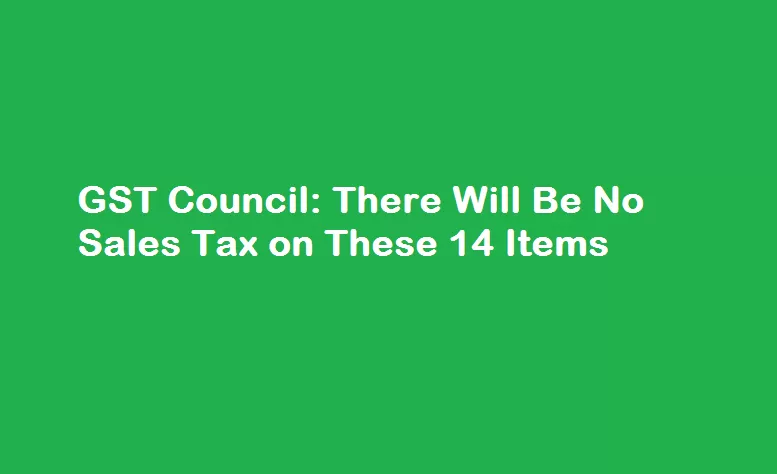Recently, it was announced on Livemint that there would be no sales tax on 14 items, including dried tamarind, roasted gram flour (besan), custard powder, and more. The GST Council took this decision during their meeting held earlier this month. The move is expected to relieve consumers who buy these items regularly as they will now be cheaper without adding additional sales tax.
Announcement: List of the 14 items exempted from sales tax
These items include various types of COVID-19-related goods, such as medical-grade oxygen, concentrators, and ventilators. The council also waived the sales tax on ambulances, vital in transporting patients to hospitals.
In addition to COVID-19-related items, the council exempted certain drugs used to treat cancer and other life-threatening diseases. These medications can be costly for patients and their families, so this exemption will help ease some financial burdens.
These exemptions are a welcome relief for many individuals and businesses struggling during these challenging times. While they may not solve all the problems caused by the pandemic, they are a step in the right direction toward supporting healthcare workers and those in need of critical supplies.
Rationale: Reasons for exemption, impact on consumers/businesses
The justification for this decision is to provide relief to consumers who are already struggling due to the economic effects of COVID-19. By removing taxes on essential goods such as medicines, oxygen concentrators, and testing kits, the government hopes to make these items more accessible and affordable for those in need.
The exemption also has an impact on businesses, particularly those involved in the production and distribution of these essential goods. With reduced taxes, companies can offer their products at lower prices without compromising their profit margins. This could increase demand for these goods and stimulate growth within the industry. Overall, the exemption serves as a necessary measure during these trying times and provides some relief for consumers and businesses.
Criticism: Opinions against the decision, potential drawbacks
Some critics argue that this exemption will only benefit the wealthy, not the ordinary people who struggle to make ends meet. Furthermore, they claim that this move might lead to a revenue loss for the government.
Another potential drawback of exempting these items from sales tax is that it may increase demand for these products, leading to a shortage of supply. This could cause prices to skyrocket, making it difficult for those who need help to afford such goods. Moreover, some argue that exemptions should have been made for essential commodities rather than luxury items.
In conclusion, while there are opinions against the GST Council’s decision to exempt 14 items from sales tax, it remains to be seen how effective this move will be in boosting consumption and stimulating economic growth.
Possible changes in GST policies, implications for other sectors
The Goods and Services Tax (GST) Council recently announced that 14 items will be exempted from sales tax. These items include COVID-19-related drugs, medical oxygen, pulse oximeters, hand sanitizers, and temperature-checking equipment. This move is expected to relieve the healthcare sector as they battle the pandemic.
However, this exemption of taxes on specific items raises questions about possible changes in GST policies and their implications for other sectors. Some experts suggest that this could lead to demands for further exemptions or reductions in taxes for other essential goods and services. This could pressure the government’s revenue collection efforts and impact public welfare programs funded by these revenues.
In conclusion, while the announcement of tax exemptions for essential COVID-19 supplies is a welcome relief for the healthcare sector, it remains to be seen how this move will impact GST policies and its implications on other sectors in the future. The government must carefully evaluate such decisions with a long-term perspective while balancing public welfare with fiscal discipline.
rajkotupdates.news:gst-council-no-gst-will-be-charged-on-these-14-items
Future Implications
The GST Council’s recent decision to exempt 14 items from the sales tax has raised questions about possible changes in GST policies and their implications for other sectors. This move is a step towards streamlining the tax system, which could further simplify the GST structure. However, it is essential to note that this exemption does not mean an overall tax reduction.
Some concerns that excluding certain items from taxation may impact revenue collection, affecting government spending on development projects. Moreover, this change may also affect other sectors, such as e-commerce and manufacturing. E-commerce companies may need help adjusting their pricing strategies due to fluctuating taxes; in contrast, manufacturers may need to re-evaluate their supply chains and distribution networks based on altered taxation policies. While the current exemption of 14 items from sales tax is a welcome move towards more efficient tax collection, its long-term impact on businesses requires close observation and analysis.
Read Also: rajkotupdates.news:pm-modis-developed-country-goal-is-the-first-of-the-five-pledges
